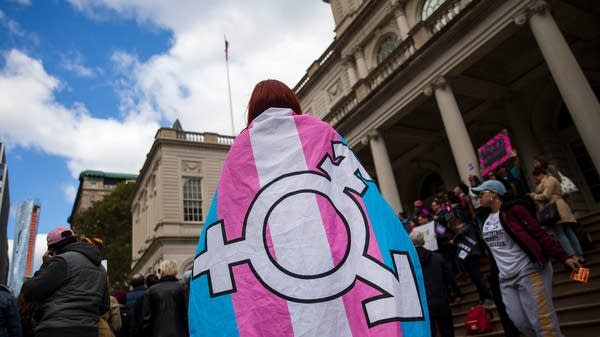Small transgender groups face barriers to funding
Intermediary funding groups are bridging that gap.

A cup filled with donations and receipts sits on Kim Watson’s desk at a health center in the Bronx. She is the vice president of CK Life, a health services nonprofit for transgender and gender-nonconforming people. She runs support groups, trains medical providers and raises money for transition-related surgeries.
But the nonprofit is underfunded, she said, running on about $25,000 a year. She relies on donations and fundraisers, and some of the money comes out of her own pocket.
“There’s no reimbursements, nobody’s giving me anything,” she said. “This is my money that I’m personally putting back into CK Life.”
She has applied for grants, but has faced a lot of rejection. As a small nonprofit without a fiscal sponsor, CK Life isn’t always eligible, and it takes time and expertise to write a successful application.
Alexander Lee is the project director for Grantmakers United for Trans Communities, a program of Funders for LGBTQ Issues. The group tracks U.S. and international LGBTQ funding. He said there is an overall lack of funding for transgender organizations. Based on the latest public financial information, he said only five U.S. trans-focused and trans-led nonprofits have budgets over $1 million. This is a problem because some foundations only fund organizations with budgets of that size or even larger.
“Unfortunately, we’re in this kind of chicken-and-egg problem,” he said. “The organizations are so small because of lack of funding. They’re not able to access more funding from formal sources, from foundations.”
To tackle this problem, intermediary funding groups have formed to bridge the gap, including the Trans Justice Funding Project and the International Trans Fund. These organizations collect money the traditional way, from foundations and wealthy donors, with the goal of helping smaller transgender groups.
“We really wanted to focus on the very, very, very grassroots groups and organizations,” said Gabriel Foster, the executive director of the Trans Justice Funding Project. “The ones that probably would never even get their applications across the desks of major foundations.”
To do this, the project only funds groups with budgets of less than $250,000. The grant application is also only a few pages long so that applicants don’t need an experienced grant writer. An all-trans and nonbinary panel selects the grantees.
“We can’t wait to be invited to the table anymore,” Foster said. “We had to build our own damn table, and we did it, and we moved over $1 million into trans communities.”
And it’s not only about getting more money to trans-focused groups. He is hopeful that putting trans people at the helm of decision-making will help shift the power dynamics of philanthropy.






